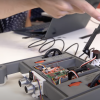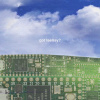Happy Monday! Today we're sharing Episode 2 of "The Fellowship of the Things," our new video series that follows our team of Creative Engineers as they build connected “internet of things” (IoT) projects in our DIY apartment inside SparkFun. In the inaugural episode, we introduced you to the apartment and showed you our first connected project - The Man Trap.
We know no home is complete without the pitter-patter of quadruped feet, so this time around we got our furry friends involved in a project we've (possibly counterintuitively) named "Weight for Treats."
We built Weight for Treats to demonstrate sensor data streaming and online warehouse sites like data.sparkfun.com, which can be used for remote data logging. The doghouse we built takes weight measurements when a dog enters, and sends it out while rewarding them with a treat.
We've also been using load sensors to log and track data from SparkFun's on-site beehive, and we cover a little bit about how we've been monitoring that setup in the video as well.
So there you have it - the latest from the Fellowship. If you have other ideas for IoT projects, let us know, and there will be another episode before you know it!








I see a lot of projects and ideas for IoT that push data to the internet. Would be nice to have some demos or such where they pull data from the internet to check if they should do something. (Like a desk lcd photoframe that pulls the current time to drive to work and updates as needed)
Never fear! A data "pulling" project is in the works :)
I'd personally like to see more MQTT integration with data.sparkfun.com. That'd make it a lot easier to respond to data being posted as well.
For the unfamiliar: MQTT is a lightweight "machine-to-machine" protocol that works fantastically for microcontrollers and their kin. It uses a subscription model for disseminating updates to clients and uses a fluid hierarchy. (A device can publish to any given topic and if a client subscribes with an appropriate wildcard they'll receive the new topic.) It requires a broker (server) to manage all publications and subscriptions. There's a lot more detail on Mosquitto's manpage.
Hi!
My project. In my fridge, I have "Force Sensitive Resistor" under the milk pitcher, "switch" for reserve. Anrduino uses CC3000 and sends data to Thingspeak server. I can watch "Consumption of milk" at: http://www.hot.ee/wzoft/nutiseade/kylmkapp.html It's not so accurate, but works :)
Sorry my English.
Best regards, Ilmar
Hi Love this internet of things event/series.. however i feel we are forgetting some things... for example the esp8266 thing...I feel that the photon is being treated like the the cool new kid but we are forgetting the previous boards in favor of just this one... I have several esp8266 and it would appear that unless we jump on the photon bandwagon these previous awesome (and inexpensive) boards are sort of forgotten. Also it is very cool to post to phant.. and the docuemntation is trully flawless but like chriscrowder said we need code to be able to activate things from phant... like a light fixture , being turned on while getting feedback and so be able to turn it off... Keep up the good work.
Very cool my vet always want daily weights of my ducks but they never sit still i got t build this in there night cage what scale did you hack ? are you detailing this build ?
It was a Taylor scale, super simple nothing special, any simple bathroom scale will work. I cut the three wires that connected the four load sensors and measured the resistance between each set of two to determine which wire was the "center tap" and which changed with weight applied, and then just hooked those up to a load sensor combinator board according to what you should (which is explained in this tutorial. Then hook it up to the HX711 amplitifer board and use the example code to calibrate it. Super quick and simple! Hope that helps =)
How about some thing that turns the light on in the day and off at night? Or even dims the lights different times.
time to build some rfid dog tags so you can match the weight to the dog.
Hook up a soil moisture sensor to a photon, then have it post data, or email someone whenever it needs watering.
If we're going that far, I'd automate the whole process with a controlled drip to maintain the moisture level, and have it only notify you in the event of issues (i.e. absence of source water). Maybe even a second drip for liquid plant food to seasonally administer that as well.
...now if only I could build something to pluck the apples out of my trees and bake me a a cobbler.
A robot cobbler-making machine? I'd buy like 3 of those! I would say I would make them, but in this case, I need something to provide me with food while I work on other projects :)